AAPI Stories: “Just show up”: Detroit activists work to build bridge between communities
Zora Bowens and Ceena Vang co-founded the intersectional activist group Whenever We’re Needed in the wake of the Atlanta spa shootings.
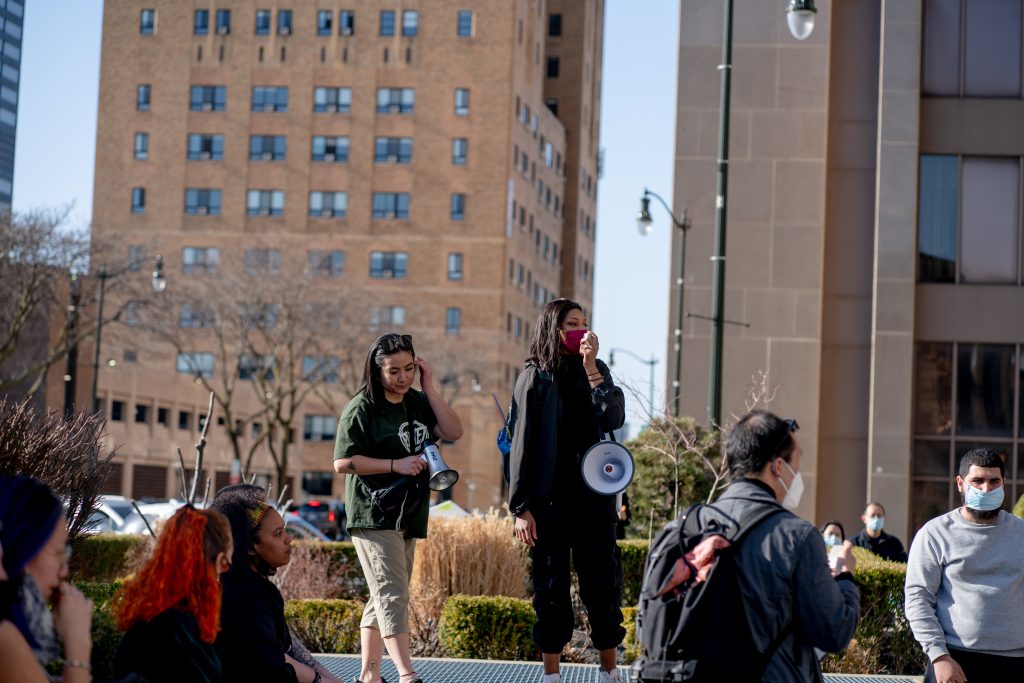
Ceena Vang and Zora Bowens are the co-founders of Whenever We're Needed.
After a gunman killed eight people, including six women of Asian descent, last year in Atlanta, Zora Bowens called her best friend, Ceena Vang. She wanted to check in on how she was feeling, but Zora also had started to notice a pattern similar to what led to the George Floyd protests: instances of violence escalating to murder.
The two of them felt called to action and created the activist organization Whenever We’re Needed. They sat down together to reflect on the impact they’ve had since organizing their first rally and the work that still needs to be done. Watch their conversation and read excerpts conversation below.
This story was created in partnership with DPTV’s One Detroit for our collaborative AAPI Stories Series. You can check out the series here.
Zora Bowens: So how did you feel last year, and the year before, when all this tension started building up around hate towards the Asian community?
Ceena Vang: I honestly felt very desensitized to it. When it became an ongoing thing, it was shocking. But I think that naturally, like it’s so easy to just become desensitized to hate crimes that everyone witnesses on a daily basis. But I feel like it wasn’t until you had called me that day where you brought it up to my attention. And that’s truly what inspired me to feel that we should do something. That’s when I felt called to action, because if my friend who isn’t Asian, but is also a person of color, can see something that I know exists, and is reminding me, hey, let’s do something that for me was the push to get up and do something with you.
Zora: I noticed it happening, especially with the rhetoric, like the “kung flu,” and especially with social media, it’s like a constant bombarding of things that are happening. And I just started noticing an uptick of violence. But I was also kind of desensitized in a way. After the George Floyd protests kind of settled down, and we started following the trials and everything like that, the night before I called, I actually got stopped by the police in Hamtramck. I was so scared, because obviously, everything that happens with Black people and police interactions sometimes. And the police interaction was actually so nice. It was the most polite police interaction I’ve ever had. And that’s when I realized the work that we’ve done has maybe had an impact. And so when I woke up, I just felt, when I saw the news about the spa shooting, it felt like I had the capacity for it. Now, that’s when I called you and all my Asian friends, I wanted to hear their story, I wanted to understand what was going on in their lives. Because if you don’t ask, you won’t necessarily know. And I clearly saw that something was happening and something was going on, and that the tensions were building. But I also just saw a parallel between, in hindsight, and then once I jumped into action, like I saw instance of violence, instance of violence, instance of violence, and then you have a mass murder. And that’s what happened in the Black community. It was an instance of violence and instance of violence and instance of violence. It was just such a parallel to the Charleston church shootings for me that I was like, if we don’t protest right now, there’s going to be another one.

Zora: So you have family that works in the beauty industry, right?
Ceena: Yeah, my mom owns a nail salon. Just working in the beauty industry, like in general is such a big livelihood for so many like Asian families and with my family being one of them. I think that that’s what struck me the most and hit home with the Atlanta spa shooting, when your livelihood is to give care to people as a service. And you end up not knowing if you’re even safe going to work. So when you hear of like a mass murder such as the Atlanta spa shooting like I can’t help but feel afraid for my sisters, my mother, my aunts, just people I know that own salons. So, I mean, because of all of that, it just causes you to live in fear and be fearful for the safety of your families. I also felt affected by it. I mean, even though I felt like more fearful for my family, I felt very afraid to leave my house, to be alone, to even do something as simple as like going outside or going to the store, and pumping your own gas, like not knowing that I could possibly be attacked and targeted just for existing. It’s so mind blowing to think about it, it definitely caused me to move differently in any public place that I go to, or honestly always feeling like someone might have like an ulterior motive.
Zora: How did you feel organizing the first protest?
Ceena: I remember telling you that it was so stressful, I was like, the amount of work we put into organizing it within like, three, four days, felt equivalent to like, trying to get my doctorate and like studying for the MCAT. That’s how crazy it was. But it was it was like, interesting. And it was fun, honestly, yeah. And stressful. But like, I enjoyed it. And it was very rewarding, like the end result of it all.
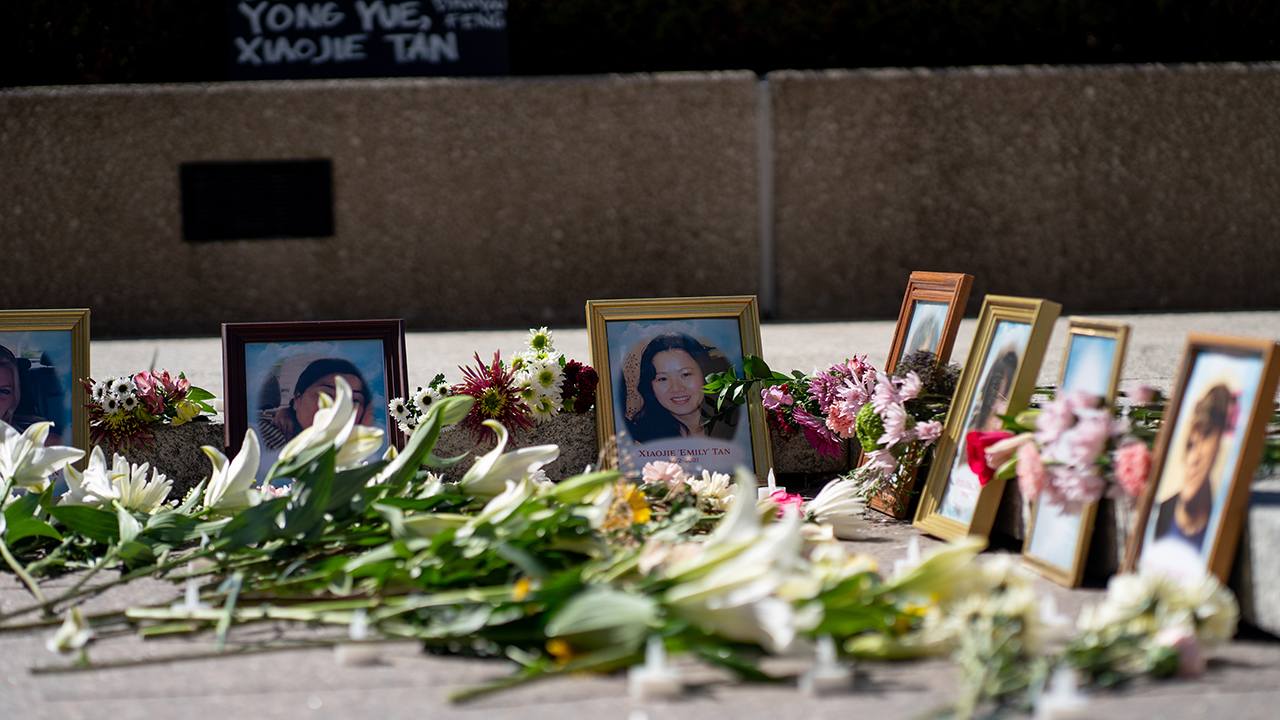
Zora: Suddenly, we went from the idea of 50 people to like 500 people, we didn’t know how many people were going to show up, then we had to be an organization. But it was really awesome to have to have that much support.
Ceena: How did you feel the day of seeing everybody?
Zora: It was really incredible for me to just see that many people come out. … I particularly didn’t want to protest on behalf of the Asian community, if they were not ready to have a protest. You know what I mean? Like, I’m willing to create this platform and facilitate this, but I’m not going to do it if the overall consensus is that we want to grieve right now. And we’re not ready for this right now. So I know one person, was like, I wish that I could come but I just can’t emotionally do this right now. But a lot of other people were like, Yeah, I’m angry, I want to have an outlet for this right now. So that’s why we did it. But seeing the crowd was, overall, it was nice to see that the consensus was, I’m ready to do this for my community.
Ceena: It was a proud moment, I wasn’t expecting it either. I remember … looking into the crowd and seeing so many familiar faces, and faces we’ve never met before, it was really nice to be able to bring so many people together, that really cared about a cause … and unity in general. “Whenever We’re Needed” to us means really just pulling up whenever we’re needed, whatever, whenever, wherever we’re called to be there if it aligns with what we stand for. But “Whenever We’re Needed” really is just about like our intersectionality within activism.
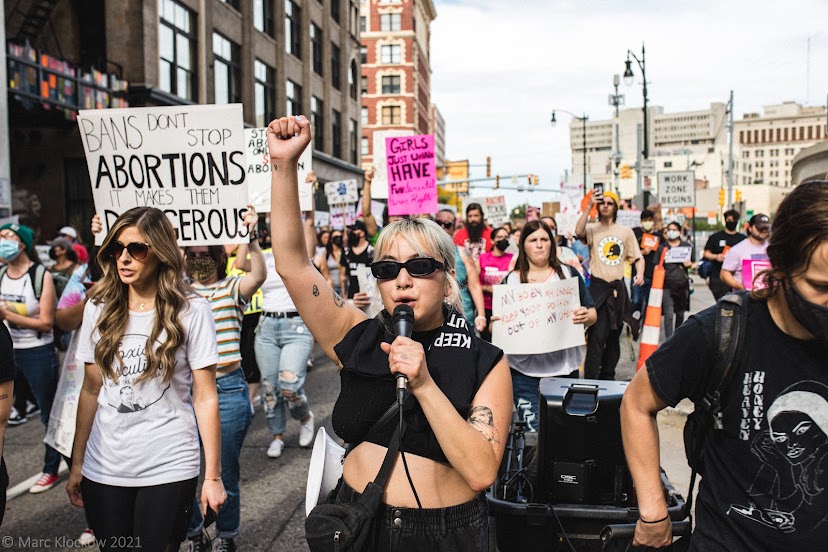
Zora: I think our track record says a lot. We pulled up for the Asian community. We pulled up for the Palestinian community, we pulled up for women’s rights. Like it’s literally just whenever we’re needed. And I think that that should be an inspiration to everyone: Just pull up, just show up and fight for what you believe in, because no one else is going to do it for you.
Ceena: It was definitely a big first time for a lot of the older generation there. And it was nice to have them come out especially like when the older Asians have been like such a big target and all the hate crimes. I remember a lot of them coming up to us and just thanking us and wanting to take photos with us and yeah, it was crazy because it’s like you and I we just see each other as just two individuals just trying to give a platform, but it was nice to be able to receive that recognition from the Asian community and be able to give back to them.
Did you think that the protests was just gonna be a one and done?
Zora: I did. I just didn’t think that far ahead. I was like, that’s what we need to do. We need to do it now. And like, this is it. But then people were asking, when’s the next rally? People were so fired up. And I was like, OK, well, we can’t just stop now. We have work to do. Something that you said that was interesting was, and this was something that I noticed as well through the protest, but like, Asian Americans coming to America, and being hardworking citizens and building businesses and making a living, supporting their families. I personally think that a lot of what the media was trying to push on us, when Stop Asian Hate started becoming more apparent, was, like, anti-Black and anti-Asian sentiment towards each other. And I’m not gonna lie, like it’s there. But it’s not as big as I think that it’s made to be. Like, with WWN, something that we are trying to do is build that bridge between communities.
Ceena: It’s difficult to convince people of what the truth may be, when it’s what we believe in. And it’s difficult because people have their own experiences as to why they would feel like, well, Asian people don’t support the Black community. And that’s based off of their experience, right? We know, like, it’s not really like what it is. And we’ve talked about how we agree that it all comes back down to white supremacy, turning everyone against one another to believe X, Y, and Z.
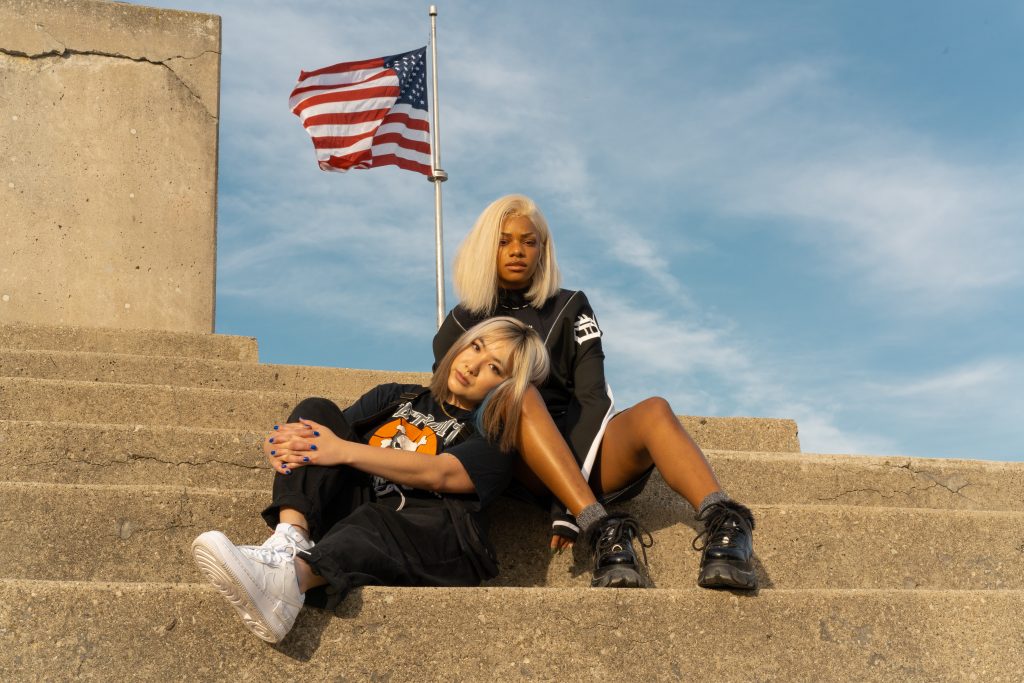
Zora: What do you think the biggest challenge is moving forward?
Ceena: I think that a big challenge is getting people to stay involved and to stay engaged. Because there’s always so many ongoing things happening in the world. Like I said, it’s easy to become desensitized, but how do we find other activists? Or how do we change the hearts the minds of people who like only see, like, tunnel vision? I think that’s like, the biggest challenge is like, how do we like maintain consistency within our activism?
Zora: Yeah, I would agree, I think that one of the biggest challenges in activism … I had to think a lot about like, what does protesting actually do? You know, besides screaming in the streets. I’m all down for making some noise. But I like to have a goal in mind. What I’ve just been thinking moving forward is what are we trying to really accomplish? And maybe it is just inspiring people. It’s been also getting people to understand what’s going on, but I know that we’ve been thinking more deeply about how can we really impact our communities in a way that creates physical change. And really grassroots change that people can actually truly be impacted by in their day to day. … When you when you have so many emotions in the beginning of a protest, like everyone’s talking about it, and you protest and you feel good, and you protest again, and you feel good. And then, the protests die out. And people tend to forget.
Ceena: Exactly, like how do we continue to channel the anger and the frustration without it dying out? I think that people believe that when there’s a lot of noise going on, and like a wave of a movement happens and then it dies down, people tend to think that it’s not relevant anymore. Just because you don’t hear about it anymore, doesn’t mean it’s gone away. What I want to do is to give it relevancy.
Zora: Just find ways to keep it in people’s minds and in people’s hearts but also to make sure that the people who are affected and the people who have joined us in our journey that we continue to give them an outlet. But also ways to actually, like I said, make tangible change within our communities.
So we’re almost a year old, what are we planning to do for our one year?
Ceena: A mass vigil to pay homage to the victims of the Atlanta spa shooting.
Zora: We also want to talk about the lives lost in the last year, as well as have a memorial or vigil for the lives at the Atlanta spa shooting. I just think that over the last year, there’s been so many victims of anti-Asian hate crimes that we need to have a moment for, but not only just a visual, but to celebrate these lives of these people, and really bring them back to the forefront of our minds and our hearts. I just want everyone to know we have been working, we haven’t forgotten. That this is still important to us, and that we should we should be together to remember that day and remember these lives that were lost.
Ceena: And having an open mic to and talks about how even though like the focus is on Asian hate crimes, we also want to highlight hate crimes in general, like multiple marginalized communities, not just the Asian community.
Zora: Do you feel like the work has had an impact?
Ceena: I feel like the work has impacted me as an individual for sure. And I think that it’s impacted like a lot of the people that I’ve met along the way too. And I mean, even knowing you, I I know, it’s impacted you and the both of us how we carry ourselves as leaders and like just the future that we look forward to.
Zora: I think I had moments where it’s like, this is amazing, but have we made an impact? And I mean, even if you look at the people in our organization, like everyone in our organization found us, like they were moved to join us and build a team together and work together. So it’s like we impacted them. When Senator Chang talked about the anti-Asian hate crime bill, we impacted our community by being able to build a platform for more people to understand that was happening. I think that we impacted the Asian American community and just letting them know that we care. Another impact for me was learning more about the Asian American community and the history of the Asian American community, but also Vincent Chin, for example. Like, I had no idea who Vincent Chin was, but also that that story happened in Detroit. I think you helped me realize a lot of connections.
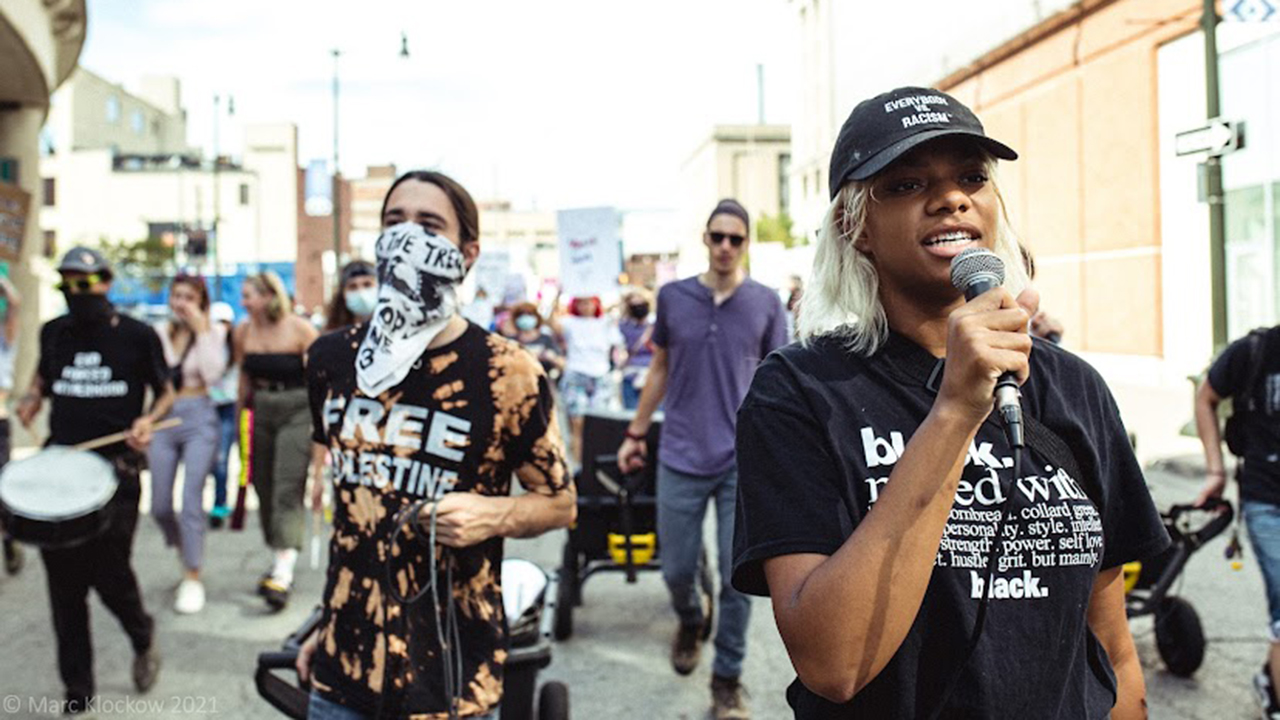
Ceena: Putting all these connections together makes me realize like how close we are to history with 40 years ago, the murder happening and that being a huge turning point for Detroit Asian Americans to take a stand. And then 40 years later, the same thing [with activism in response to hate crimes] happening again.
Zora: It’s crazy to think that we’re carrying on this legacy of fighting for Asian Americans in Detroit in particular. I just I didn’t realize that there was such a gap between those things. I don’t believe in coincidences, like, period. So I think just like with Vincent Chin, the fact that we are carrying on this legacy and that, like the connections that we have in Detroit, to people that were very close to that story, like I don’t think any of it is a coincidence. I think that everything that has happened is what was meant to happen as far as our story goes.
Ceena: Yeah, all of this is inspiring. I feel inspired and overwhelmed. And some days I’m absolutely terrified. Because I feel like these are such big shoes to fill. But I feel like we’re more than capable of filling these shoes. And I wouldn’t do it with anybody else.
Has knowing me changed you?
Zora: Yeah, I think that, you know …
Ceena: I’m gonna cry.
Zora: I know. I think that just our friendship. … No, I can’t.
Ceena: OK, I’ll go first. Knowing you has changed me, you inspire me daily, regardless of any hardships that we go through, or bumps in the road. You’re my rock. And if it comes to activism, or fighting a guy who who cut in front of me in line at the bar, or taking over the world. Like, it’s me and you.
Zora: Knowing you has also changed my life in ways I just couldn’t even imagine. I think our friendship was, I think the first time that I realized, you know, like, what a true friendship is. Finding someone that reassures me that the world can be better if we do it together. The things that we’ve created together, the movements we’ve made together …
Ceena: It’s iconic. It’s iconic.
Zora: Yeah, it really is. I really wouldn’t trade it for the world.
Trusted, accurate, up-to-date.
WDET strives to make our journalism accessible to everyone. As a public media institution, we maintain our journalistic integrity through independent support from readers like you. If you value WDET as your source of news, music and conversation, please make a gift today.
